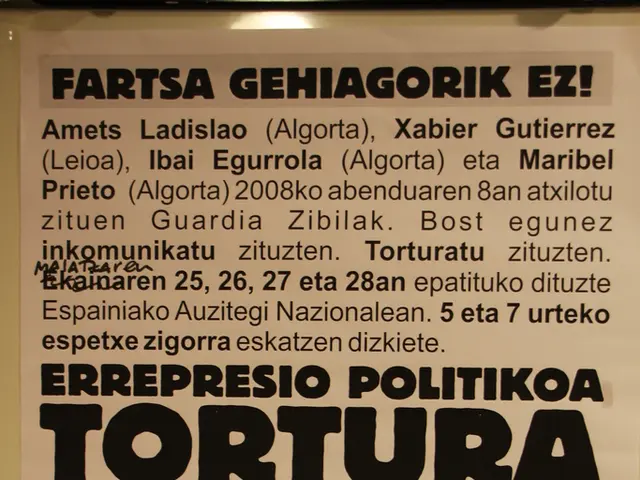Questioning International Weapons Trade: Can Allegiance to Israel Remain Intact?
In the heart of Germany, the state of North Rhine-Westphalia (NRW) maintains a strong connection with Israel, with over 30 city partnerships and numerous collaborations in science, associations, organizations, and civil society. This friendship, according to Nathanael Liminski, the Minister for International Affairs of NRW, is built on the solidarity actions of civil society.
Last August, Liminski expressed his stance on the Israeli-Palestinian conflict, emphasizing the need for political clarity and understanding for the situation of all people in the region. This sentiment was echoed by actress Elmira Rafizadeh, a Cologne resident, who was one of the first signatories of an open letter calling for concrete steps to alleviate the suffering in the Gaza Strip.
However, when Chancellor Friedrich Merz imposed a partial arms embargo on Israel in response to its planned occupation of Gaza City, the response from NRW politicians was notably silent. The current stance of NRW politicians on Merz's Israel policy and the partial arms embargo is not explicitly detailed in available sources.
This silence stands in contrast to the broader German political climate, where Merz's policy has sparked internal party tensions, particularly within the Social Democratic Party (SPD). Some lawmakers have advocated for stronger measures against Israel, while others have expressed openness to reevaluating Germany’s stance, including potential EU sanctions or suspension of the EU-Israel Association Agreement if the humanitarian situation does not improve.
In recent days, several German cities, including Düsseldorf and Bonn, have started a new attempt to take in needy children from the Gaza Strip and Israel, but the Federal Foreign Office has so far rejected this initiative. This rejection has been met with criticism from Philipp Peyman Engel, the editor-in-chief of a weekly newspaper, who criticized the Chancellor's decision to impose a partial arms embargo on Israel.
Despite the lack of public statements from NRW politicians, it is plausible that they are engaged in the broader CDU debate, likely sharing concerns similar to those expressed by party members elsewhere in Germany about unilateral decisions and the humanitarian crisis in Gaza. The state has utilised the wave of solidarity following October 7 to deepen and broaden relationships between hospitals, municipalities, and businesses with Israel.
Meanwhile, the state parliament of NRW serves as a reminder of the Israeli hostages taken by Hamas on October 7, 2023, with a banner hanging in the chamber. However, the silence from NRW politicians on the issue of the partial arms embargo to Israel remains.
References:
[1] Deutsche Welle (2025). Friedrich Merz under fire for Israel policy. [online] Available at: https://www.dw.com/en/friedrich-merz-under-fire-for-israel-policy/a-59351442
[2] The Jerusalem Post (2025). Merz: Israel's actions in Gaza violate international humanitarian law. [online] Available at: https://www.jpost.com/international/israel-in-the-world/merz-israels-actions-in-gaza-violate-international-humanitarian-law-681760
[3] The Guardian (2025). Germany mulls EU sanctions on Israel over Gaza crisis. [online] Available at: https://www.theguardian.com/world/2025/aug/20/germany-mulls-eu-sanctions-on-israel-over-gaza-crisis
[4] The New York Times (2025). Merz Calls for Urgent Aid to Gaza as He Criticizes Israel. [online] Available at: https://www.nytimes.com/2025/08/12/world/middleeast/merz-gaza-israel.html
The silence from North Rhine-Westphalia (NRW) politicians regarding Chancellor Friedrich Merz's Israel policy and the partial arms embargo remains questionable, especially considering the discord within the Social Democratic Party (SPD) over the same issue. NRW's ongoing attempts to strengthen ties with Israel, as demonstrated by deepening relationships between hospitals, municipalities, and businesses, may suggest a more nuanced stance on the environmental, political, and humanitarian issues surrounding war-and-conflicts in the region.
In light of the General News regarding internal party tensions in the German political landscape and the risk of EU sanctions or suspension of the EU-Israel Association Agreement, the lack of policy-and-legislation articulation from NRW politicians on Merz's policy response to the crisis in Gaza is noteworthy.





